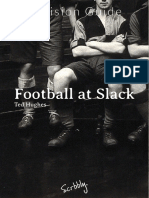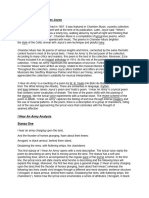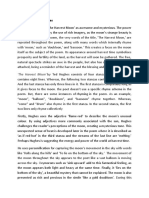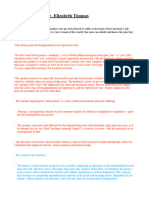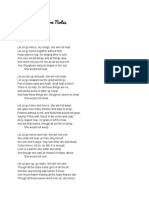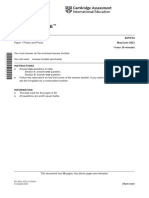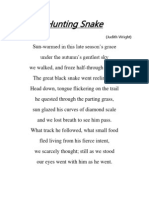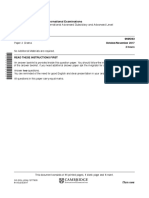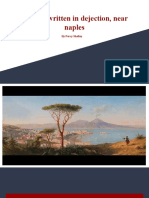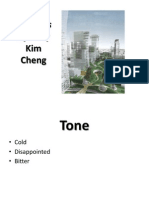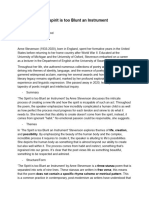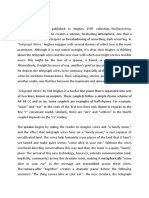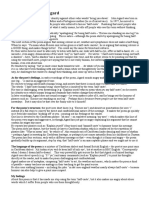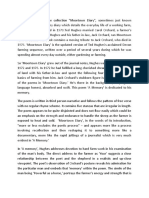Football at Slack Notes
‘Football at Slack’
by Ted Hughes is an image-rich poem that talks about a fewmen who were playing football on a hill. It is taken from his 1979 collecon of poems called Remains of Elmet. The football in the rst secon is their source of merriment. However, in the next secon, they start to enjoy the rhythm of rain asthe poet captures the momentary beauty of nature in this poem. The images of the clouds thronging the sky, the sudden starng of rain, and at last, the sunpeeping through the clouds and this makes the poem an interesng one to readand imagine about.
‘Football at Slack’
by Ted Hughes consists of eight stanzas. Some stanzas of thepoem are short and some are comparably long. The overall poem is in free verse.There isn’t any regularity in the line lengths of the poem. Like the stanzas, somelines of the poem are comparably long. Whereas some lines are contracted forthe sake of emphasizing the images or ideas present in those lines.The poem starts with the descripon of a football game which is taking placebetween two men's teams in a small village at Slack, somewhere in the hills. Inthe rst line the words 'plunging' and 'bareback' stand out as being unusual. Theymight both be connected to horses. 'Plunging' suggests the way a horse moves,almost rolling up and down. 'Bareback' suggests the smooth rounded back of thehorse with a slight dip in the centre. The poet is using these words metaphorically— to describe the ups and downs of hills and valleys and the smooth tops of rounded hills. The poet refers to the men dressed in bunng or bright color jerseys. It is also a reference to their child-like spirit and spontaneity. Apart fromthat, the poet refers to their exibility and energy in the last line by the use of theverb “bounce.” .The other feature of the rst stanza is the number of 'b's':'bunng', 'Bounced', and 'blown ball bounced'. Alliteraon is used usually todraw aenon to the idea of the constantly moving ball. In the 'blownball bounced,' the harsh b sound of the three words makes us focus on the ball

like the men who are pung all of their concentraon into the game. It alsodescribes the sound the ball makes as it hits o the ground and players as it ispassed around.In the second stanza, the rst image presented is of the men jumping to head theball. The highly spirited men described by the phrase “merry-coloured” lookedlike water if they were all moving or owing in the same direcon —like a steadystream for they were following the movement of the ball up and down the eldand from side to side. The second image in this stanza is of the ball that wentdownhill like the sudden gush of air.In the third stanza, Hughes refers to the men running aer the ball as rubberycreatures. It seems that the football injected elascity into those men. The ball islikened to a person as it “jumped up” and he makes the men sound like the ball in'rubbery', further suggesng that their movement is like bouncing. However, theball got stuck in a “gulf of treetops”. Aer seeing what had happened, theybecame agitated and shouted at the ball together. But, without giving an ear totheir frustraons, the ball rolled down to the valley. The alliteraon which endsthe stanza draws aenon to the ball again: “the ball blew back.”In the fourth stanza, Hughes quickly paints a new picture in the poem. Whilethose men were busy shoung at the ball, suddenly the wind started to blow andclouds like stones gathered in the sky. The mood of the poem in this seconreects the men’s state of mind aer losing the ball. It seems as if the winds arecoming from “ery holes in heaven “which refers to the breaks in the clouds fromwhere the red sun is shining through, and the winds are personied. Hughesmakes them sound like a great god who is piling clouds on the distant hills. Twomore images in the stanza make the picture more vivid. 'Mad oils' suggests thatthe landscape is like an oil painng — although perhaps “mad” as everything fromthe ball, the men are almost ‘mad,’ their excitement and heightened enthusiasmis out of bounds. “The rain lowered a steel press,”this gives a sense of the Mother Nature lowering the clouds and producingterrible rain. It also gives the picture of the colour of the sky, a dark grey and theforce of the downpour creates a depressing mood.In the h stanza, the poet captures how those men forgot about the ball andstarted to enjoy the rainfall. Here, it seems that they were no longer mature men.They were behaving, and playing just like lile children. They were “washed and
happy”. However, the images referred to by “plastered” hair and “puddle glier”paint an interesng picture of their hair wet and damp and pressed down whiletheir kicks and jumps are throwing water from the small ponds of water likeglier of water droplets being thrown around. The word bobbed again gives usthe image of water and the idea that the men are sll cheerful. The words bobbedand up give the idea of the men being above the water and surviving the heavydownpour. This contrasts with the depressive weather from stanza four andbrightens the tone of the poem, which shows the men’s posive experience. In the sixth stanza, Hughes presents a rain-drenched picture of the landscape. Thehill appeared to the poet as a “humped world”. The word humped refers to thehilly seng and sank presents the idea that the world has disappearedunderneath the vast amount of water that has fallen. There is hyperbole in the
line, “And the valleys blued unthinkable”. The valleys turned blue for the cloggedwater. At last, the poet refers to the “Atlanc depression” which was the cause of the precipitaon.In the seventh stanza, the poet refers to their acvity during the heavy downpour.Here, the poet uses hyperbolic expressions to present their level of excitement.The word leapt contrasts with sank as the men are above the water and that it isnot restraining their game play. ‘Bicycled’ also gives the impression that the menare very acve and that the rainfall is not detracng them from the enjoyment of their game. The men are obviously sll enjoying this posive experience eventhough the weather is terrible. In the last stanza, Hughes ironically refers to thesun’s sudden appearance. The golden holocaust is a metaphor for the sun. Liingthe clouds edge personies the sun, as if it is liing a blanket to see somethinginteresng. This is eecve as it contrasts with the previous damp weather. Thepoet refers to the sun as a “golden holocaust”. The poet implies that as the rainstopped and the sun started to appear in the sky, those men again returned toreality. The child inside each person again faded away. The poet holds the sunresponsible for it. That’s why he uses “holocaust” as a reference to the sun’scruelty. The nal two lines of the poem are dierent to the rest of the poem asthe weather has improved and is dry. This suggests that maybe the men’sdeterminaon throughout their game has caused the sun to come out..In conclusion, Ted Hughes poem Football at Slack conveys a posive experiencethrough the men’s enthusiasm and the unring eort of the players during a
football match taking place in awful weather condions. Hughes clever use of techniques used to contrast the men’s posive atude and the terrible weather. The poet was also born and brought up in Yorkshire. The descripon of the placeseems like the poet had an associaon with this place. He might have played onthat hill slope and lost a football just like those men in the poem lost theirs. Theauthor uses a variety of imagery in the poem to help express the experience hemost likely had as a child of viewing a football game and he had penned it downwith such descripve verbs and language that one could really imagine being in theexact situaon.







